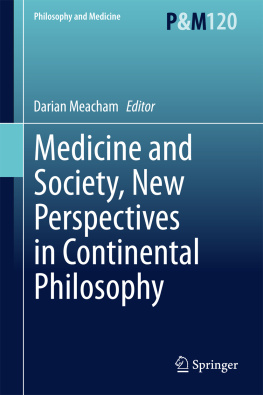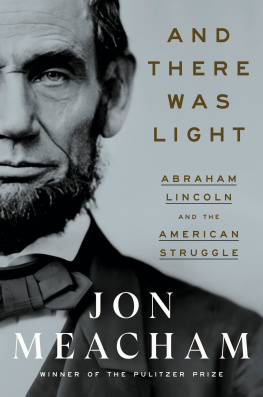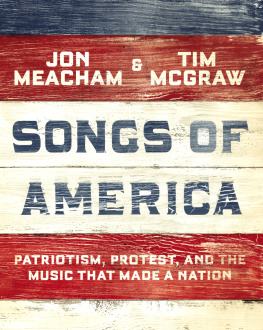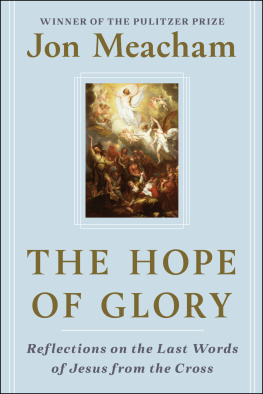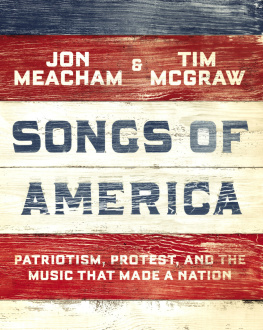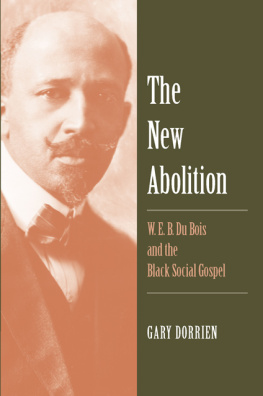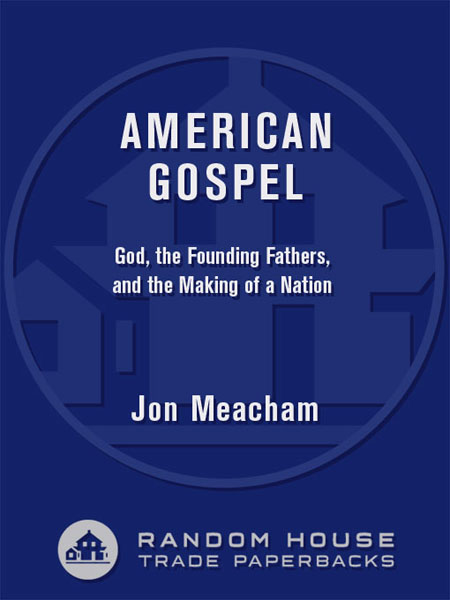
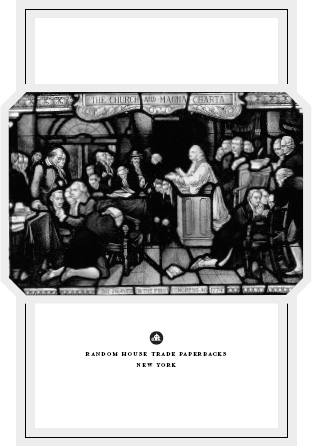
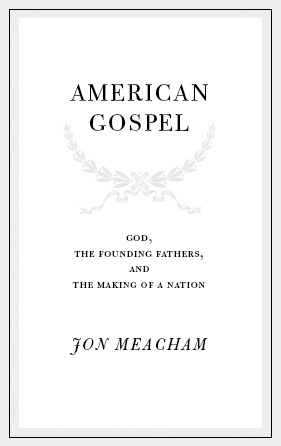
CONTENTS
INTRODUCTION
American Gospel: Faith and Freedom
I | GOD AND MAMMON
Fortune, Fear, and the First Colonies
II | AND NONE SHALL BE AFRAID
The Revolution, the Constitution, and the Creation of the Presidency
III | LET US DIE TO MAKE MEN FREE
The Civil War, Lincoln, and Darwin
IV | IMPERFECT THOUGH WE ARE
Wars Against the Great Depression, Totalitarianism, and Jim Crow
V | THE FIGHT WAS ON!
The Martyrdom of Dr. King, the Rise of a New Right, and Reagans Delicate Balance
VI | OUR HOPE FOR YEARS TO COME
History, Religion, and Common Sense
APPENDIX A
In Their Own Words: Selected Documents on Religion in America
APPENDIX B
Scripture and State: The Presidents Choice of Inaugural Bible Verses
To Mary and Sam
Remember the days of old, consider the years of many generations: ask thy father, and he will show thee; thy elders, and they will tell thee.
THE SONG OF MOSES, DEUTERONOMY 32:7
INTRODUCTION

AMERICAN GOSPEL: FAITH AND FREEDOM

The God who gave us life gave us liberty at the same time.
THOMAS JEFFERSON, A SUMMARY VIEW OF THE RIGHTS OF BRITISH AMERICA, JULY 1774
Religion and liberty must flourish or fall together in America. We pray that both may be perpetual.
REVEREND WILLIAM SMITH, D.D., IN A SERMON PREACHED AT CHRIST CHURCH, PHILADELPHIA, ON FRIDAY, JUNE 23, 1775, THE DAY GEORGE WASHINGTON LEFT THE CITY TO TAKE COMMAND OF THE CONTINENTAL ARMY
A s the sad news from the house on the hill reached town, the courthouse bell in Charlottesville tolled in tribute. Thomas Jefferson was dead, succumbing at ten minutes to one on the afternoon of Tuesday, July 4, 1826, the fiftieth anniversary of the Declaration of Independence. Secretive and ambitious, brave and curious, committed to liberty, the Enlightenment, and the American experiment, Jefferson was among the most eloquent and forceful of the Founders on the fraught subject of religion. Intellectually daring, Jefferson had little time for the intricacies of creeds, talk of miracles, and the familiar tenets of the faith that grew out of the life and, for believers, resurrection of Jesus. I am of a sect by myself, as far as I know, Jefferson said.
As a student of history he also knew Europe had fought wars and led crusades over faith and that the first English colonies in North America had hardly been models of religious freedom. As a man of science he believed in the primacy of rational observation, dismissing much of the supernatural as superstition. Confident in the power of the mind to discern natural and moral truths, he once spent a few evenings in the White House going through the Gospels with a razor, excising passages he found implausible in order to arrange his own version of Jesus teachings. On another occasion, he waved away talk of the Holy Trinity. Ideas must be distinct before reason can act upon them, and no man ever had a distinct idea of the trinity, Jefferson said. It is the mere Abracadabra of the mountebanks calling themselves priests of Jesus.
Nothing was simple about Jefferson, and nothing is simple about the debates over religion and public life nearly two centuries after him. Neither conventionally devout nor wholly unbelieving, Jefferson surveyed and staked out an American middle ground between the ferocity of evangelizing Christians on one side and the contempt for religion of secular philosophes on the other. The right would like Jefferson to be a soldier of faith, the left an American Voltaire. He was, depending on the moment, both and neither; he was, in other words, a lot like many of us.
In the opening years of the twenty-first century, some Americans believe the country has strayed too far from God; others fear that zealots (from the White House to the school board) are waging holy war on American liberty; and many, if not most, seem to think that we are a nation hopelessly divided by religion.
None of these dire views is quite right. The great good news about Americathe American gospel, if you willis that religion shapes the life of the nation without strangling it. Belief in God is central to the countrys experience, yet for the broad center, faith is a matter of choice, not coercion, and the legacy of the Founding is that the sensible center holds. It does so because the Founders believed themselves at work in the service of both God and man, not just one or the other. Driven by a sense of providence and an acute appreciation of the fallibility of humankind, they created a nation in which religion should not be singled out for special help or particular harm. The balance between the promise of the Declaration of Independence, with its evocation of divine origins and destiny, and the practicalities of the Constitution, with its checks on extremism, remains perhaps the most brilliant American success.
This victory over excessive religious influence and excessive secularism is often lost in the clatter of contemporary cultural and political strife. Looking back to the Founding is neither an exercise in nostalgia nor an attempt to deify the dead, but a bracing lesson in how to make a diverse nation survive and thrive by cherishing freedom and protecting faith. And faith and freedom are inextricably linked: It is not for priests or pastors or presidents or kings to compel belief, for to do so trespasses on each individuals God-given liberty of mind and heart. If the Lord himself chose not to force obedience from those he created, then who are men to try?
There is a vast and growing literature about the Founding Fathers, much of it quite wonderful, and a stream of strong scholarship about the problem of church and state. Yet because faith is such an emotional subject for both believers and nonbelievers, discussion of the question of religion and public life can often be more divisive than illuminating. Secularists reflexively point to the Jeffersonian wall of separation between church and state as though the conversation should end there; many conservative Christians defend their forays into the political arena by citing the Founders, as though Washington, Adams, Jefferson, and Franklin were cheerful Christian soldiers.
The real saga of God, the Founding Fathers, and the making of the nation is a tale that opens with swashbuckling adventurers searching for gold in Virginia and sturdy but strict Puritans trying to create a Christian commonwealth in New England. The drama is Americas drama, from George Washington to Ronald Reagan, from the Civil War to civil rights. The story of how the Founders believed in faith and freedom, and grappled with faith and freedom, has a particular resonance for our era. Given the world in which they liveda time of divisive arguments about God and politicsthe Founders repay close attention, for their time is like our time, and they found a way to honor religions place in the life of the nation while giving people the freedom to believe as they wish, and not merely to tolerate someone elses faith, but to respect it.
Next page


